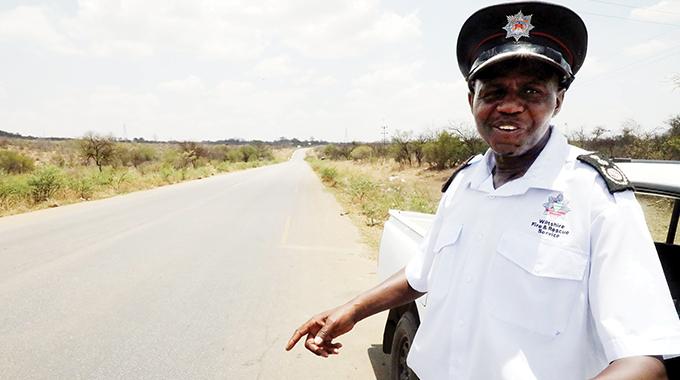News / National
The 1km death trap on Bulawayo-Gwanda Road
04 Nov 2024 at 06:45hrs |
0 Views

A one-kilometre stretch of road along the busy Bulawayo/Gwanda Highway, just past the Kensington shops, has been dubbed a "death trap" following four accidents in the area within the last two months. In response to rising safety concerns, the Bulawayo Fire Brigade has initiated an investigation into the potential presence of oil residue, which may be contributing to the road's hazardous conditions.
To address these concerns, the Fire Brigade enlisted the help of the Environmental Management Agency (EMA) to conduct tests on the highway segment to determine if oil residue was present. However, the investigation revealed that no oil was found on the road.
Tragically, just last Saturday, two passengers aboard an Inter Africa bus lost their lives when the vehicle veered off the road and overturned on this treacherous stretch. Of the 50 passengers on board, 43 sustained injuries and were transported to Mpilo Hospital for medical treatment. The accident occurred near Umguza Bridge while the bus was en route to the Bulawayo city centre from Mutare.
Mr. Mhlangano Moyo, Chief Fire Officer for the Bulawayo Fire Brigade, stated that the investigation into the road's condition was launched following increased complaints from motorists. Many have reported that the road becomes exceedingly slippery when it rains, creating perilous driving conditions.
"Some time ago, a vehicle carrying containers with oil was involved in an accident in the same area," Mr. Moyo explained. "A thorough clean-up exercise was conducted by the relevant authorities, but we continue to receive complaints suggesting that some oil residue may still be present, which exacerbates the slippery conditions during rain."
Despite the absence of oil residue confirmed by EMA, Mr. Moyo emphasized the urgency of the situation. He noted that in addition to the recent bus accident, there had been several other incidents in the same area, including two haulage trucks and a vehicle belonging to a non-governmental organization, which resulted in three serious injuries.
"The bus accident occurred after the area received some rains," he said. "The Bulawayo Fire Brigade recommends that the road be resealed to prevent it from becoming slippery in wet conditions."
In light of these findings, a team from the Ministry of Transport and Infrastructural Development visited the site on Monday to assess the road. Mr. Moyo also proposed the installation of speed humps in the area to compel drivers to reduce their speed when approaching this dangerous stretch.
Experts warn that road surfaces can become particularly slick during the hot and dry season due to the higher levels of oil rising to the surface as asphalt temperatures increase. The bitumen used in road construction can bubble up, making the roads less stable and more susceptible to skidding.
As the community grapples with the dangerous conditions on the Bulawayo/Gwanda Highway, calls for urgent action and improvements to the road infrastructure have intensified to prevent further tragedies.
To address these concerns, the Fire Brigade enlisted the help of the Environmental Management Agency (EMA) to conduct tests on the highway segment to determine if oil residue was present. However, the investigation revealed that no oil was found on the road.
Tragically, just last Saturday, two passengers aboard an Inter Africa bus lost their lives when the vehicle veered off the road and overturned on this treacherous stretch. Of the 50 passengers on board, 43 sustained injuries and were transported to Mpilo Hospital for medical treatment. The accident occurred near Umguza Bridge while the bus was en route to the Bulawayo city centre from Mutare.
Mr. Mhlangano Moyo, Chief Fire Officer for the Bulawayo Fire Brigade, stated that the investigation into the road's condition was launched following increased complaints from motorists. Many have reported that the road becomes exceedingly slippery when it rains, creating perilous driving conditions.
"Some time ago, a vehicle carrying containers with oil was involved in an accident in the same area," Mr. Moyo explained. "A thorough clean-up exercise was conducted by the relevant authorities, but we continue to receive complaints suggesting that some oil residue may still be present, which exacerbates the slippery conditions during rain."
"The bus accident occurred after the area received some rains," he said. "The Bulawayo Fire Brigade recommends that the road be resealed to prevent it from becoming slippery in wet conditions."
In light of these findings, a team from the Ministry of Transport and Infrastructural Development visited the site on Monday to assess the road. Mr. Moyo also proposed the installation of speed humps in the area to compel drivers to reduce their speed when approaching this dangerous stretch.
Experts warn that road surfaces can become particularly slick during the hot and dry season due to the higher levels of oil rising to the surface as asphalt temperatures increase. The bitumen used in road construction can bubble up, making the roads less stable and more susceptible to skidding.
As the community grapples with the dangerous conditions on the Bulawayo/Gwanda Highway, calls for urgent action and improvements to the road infrastructure have intensified to prevent further tragedies.
Source - The Chronicle
Join the discussion
Loading comments…

















